中医和西医的对比英文版
西医和中医什么区别英语作文
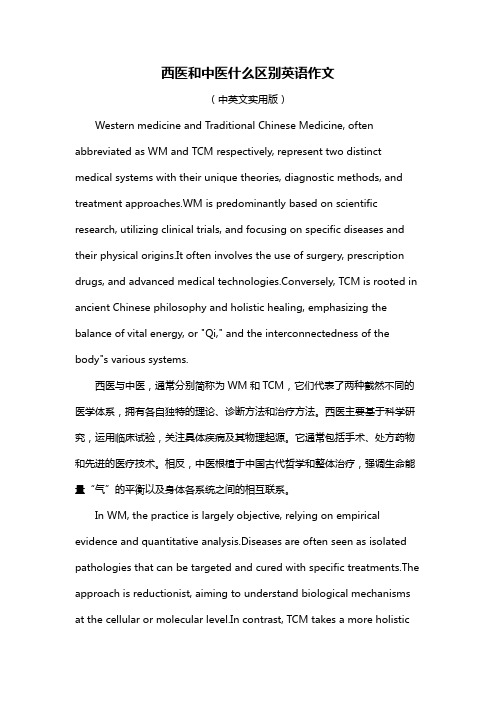
西医和中医什么区别英语作文(中英文实用版)Western medicine and Traditional Chinese Medicine, often abbreviated as WM and TCM respectively, represent two distinct medical systems with their unique theories, diagnostic methods, and treatment approaches.WM is predominantly based on scientific research, utilizing clinical trials, and focusing on specific diseases and their physical origins.It often involves the use of surgery, prescription drugs, and advanced medical technologies.Conversely, TCM is rooted in ancient Chinese philosophy and holistic healing, emphasizing the balance of vital energy, or "Qi," and the interconnectedness of the body"s various systems.西医与中医,通常分别简称为WM和TCM,它们代表了两种截然不同的医学体系,拥有各自独特的理论、诊断方法和治疗方法。
西医主要基于科学研究,运用临床试验,关注具体疾病及其物理起源。
它通常包括手术、处方药物和先进的医疗技术。
相反,中医根植于中国古代哲学和整体治疗,强调生命能量“气”的平衡以及身体各系统之间的相互联系。
中药与西药的区别英语作文
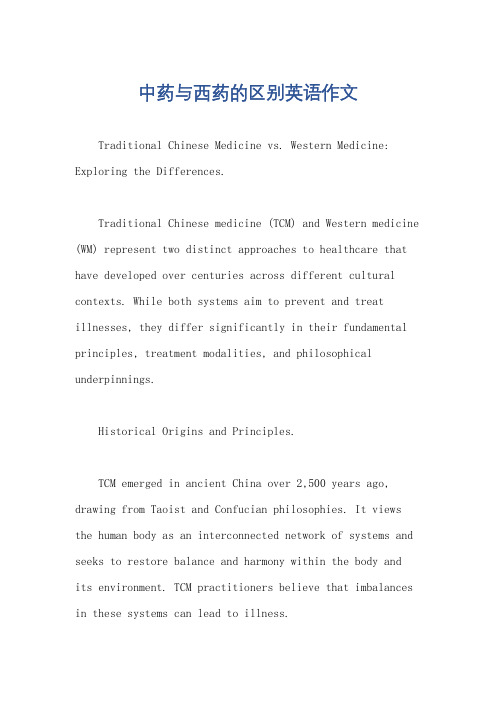
中药与西药的区别英语作文Traditional Chinese Medicine vs. Western Medicine: Exploring the Differences.Traditional Chinese medicine (TCM) and Western medicine (WM) represent two distinct approaches to healthcare that have developed over centuries across different cultural contexts. While both systems aim to prevent and treat illnesses, they differ significantly in their fundamental principles, treatment modalities, and philosophical underpinnings.Historical Origins and Principles.TCM emerged in ancient China over 2,500 years ago, drawing from Taoist and Confucian philosophies. It views the human body as an interconnected network of systems and seeks to restore balance and harmony within the body andits environment. TCM practitioners believe that imbalances in these systems can lead to illness.In contrast, WM originated in Europe and North America in the 19th and 20th centuries. It is based on scientific principles and the germ theory of disease. WM practitioners focus on identifying and treating specific diseases through pharmaceutical drugs, surgeries, and other technological interventions.Treatment Modalities.TCM employs a wide range of treatment modalities, including:Herbal medicine: Using plants and natural substances to regulate the body's systems.Acupuncture: Inserting thin needles into specific points on the body to stimulate energy flow.Moxibustion: Burning an herb called moxa on or near the skin to promote healing.Cupping: Applying suction cups to the skin to release tension and promote circulation.Tai chi and qigong: Mind-body exercises that balance energy and improve well-being.WM, on the other hand, relies primarily on pharmaceutical drugs, surgeries, and other technological interventions to treat diseases. Drugs are designed totarget specific biological processes and alleviate symptoms. Surgeries are performed to remove diseased tissues orcorrect anatomical abnormalities.Philosophical Underpinnings.One of the key differences between TCM and WM lies in their philosophical underpinnings. TCM views the human body as a holistic entity, where all parts are interconnectedand influence each other. Treatment aims to restore balance and harmony within the whole body, rather than focusing solely on specific symptoms.WM, on the other hand, adopts a reductionist approach.It breaks down the human body into its component parts and focuses on identifying and treating specific diseases. The emphasis is on measurable outcomes and evidence-based treatments.Strengths and Limitations.TCM has several strengths, including its emphasis on prevention, holistic approach, and use of natural remedies. It can be effective for treating a wide range of conditions, particularly those related to stress, pain, and chronic illnesses. However, TCM lacks scientific evidence tosupport many of its claims and its effectiveness can vary depending on the skill and experience of the practitioner.WM has strengths in treating acute diseases and emergency situations, where precise interventions and quick results are necessary. Scientific research provides a solid foundation for the use of drugs and surgeries. However, WM can be less effective for chronic conditions, and its reliance on pharmaceutical drugs can lead to side effectsand potential drug interactions.Integration and Synergy.In recent years, there has been growing recognition of the potential benefits of integrating TCM and WM. Both systems have something to offer, and a comprehensive approach to healthcare can combine the strengths of each. For example, TCM can be used as a complementary therapy to support conventional treatments for cancer, pain management, and mental health conditions.Conclusion.TCM and WM represent two distinct yet valuable approaches to healthcare. Both systems have uniquestrengths and limitations, and their integration can leadto a more comprehensive and effective approach topreventing and treating illnesses. By understanding the differences and potential synergies between these two systems, we can unlock a wider range of options for improving and maintaining our well-being.。
英文版中医TCM与西医WesternMedicine的比较
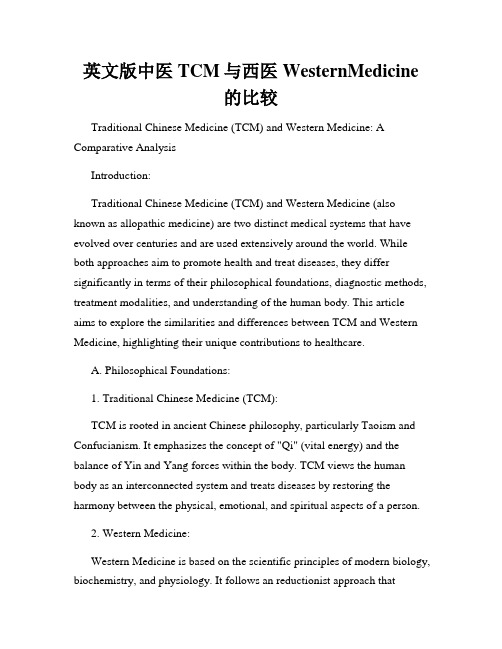
英文版中医TCM与西医WesternMedicine的比较Traditional Chinese Medicine (TCM) and Western Medicine: A Comparative AnalysisIntroduction:Traditional Chinese Medicine (TCM) and Western Medicine (also known as allopathic medicine) are two distinct medical systems that have evolved over centuries and are used extensively around the world. While both approaches aim to promote health and treat diseases, they differ significantly in terms of their philosophical foundations, diagnostic methods, treatment modalities, and understanding of the human body. This article aims to explore the similarities and differences between TCM and Western Medicine, highlighting their unique contributions to healthcare.A. Philosophical Foundations:1. Traditional Chinese Medicine (TCM):TCM is rooted in ancient Chinese philosophy, particularly Taoism and Confucianism. It emphasizes the concept of "Qi" (vital energy) and the balance of Yin and Yang forces within the body. TCM views the human body as an interconnected system and treats diseases by restoring the harmony between the physical, emotional, and spiritual aspects of a person.2. Western Medicine:Western Medicine is based on the scientific principles of modern biology, biochemistry, and physiology. It follows an reductionist approach thatfocuses on identifying specific causes of diseases and their corresponding treatments. Western Medicine heavily relies on evidence-based research and emphasizes the use of pharmaceutical drugs, surgery, and medical technology for diagnosis and treatment.B. Diagnostic Methods:1. Traditional Chinese Medicine (TCM):TCM diagnoses are based on several methods, including observation, listening, smelling, palpation, and questioning. Practitioners look for specific patterns such as pulse qualities, tongue appearance, facial features, and overall energy levels to determine the underlying imbalances within the body. These patterns guide the TCM treatment plan.2. Western Medicine:Western Medicine employs laboratory tests, imaging techniques (such as X-rays and MRI scans), physical examinations, and medical history assessments to arrive at a diagnosis. It focuses on identifying the specific disease or condition based on objective measurements and scientific evidence.C. Treatment Modalities:1. Traditional Chinese Medicine (TCM):TCM treatment modalities include acupuncture, herbal medicine, dietary therapy, massage (Tui Na), and exercise (such as Tai Chi and Qigong). The goal of TCM treatment is to restore the body's natural balance and promote self-healing.2. Western Medicine:Western Medicine utilizes pharmaceutical drugs, surgical interventions, physical therapies, and supportive care to manage diseases. Treatment methods aim to eliminate pathogens, alleviate symptoms, and provide immediate relief.D. Understanding of the Human Body:1. Traditional Chinese Medicine (TCM):TCM views the human body as an integrated system, where the organs and energetic pathways (meridians) work together to maintain health. The focus is on the overall balance of Yin and Yang forces, the flow of Qi, and the organ systems' interconnections.2. Western Medicine:Western Medicine perceives the human body as a collection of organ systems with specific functions. It emphasizes the anatomy, physiology, and biochemistry of the body. The emphasis is on understanding the biological processes and pathology of diseases.Conclusion:While TCM and Western Medicine have different philosophical foundations, diagnostic methods, treatment modalities, and understanding of the human body, both systems play crucial roles in healthcare. TCM offers a holistic approach that focuses on restoring balance and promoting overall well-being, while Western Medicine utilizes advanced technology and evidence-based research to diagnose and treat diseases. Recognizing thestrengths of each system allows for a more comprehensive and integrated approach to healthcare, benefiting patients from the best of both worlds.。
中医和西医的对比英文版
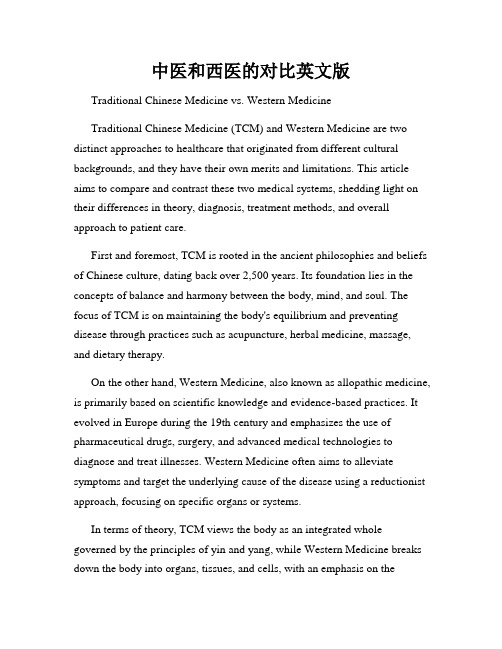
中医和西医的对比英文版Traditional Chinese Medicine vs. Western MedicineTraditional Chinese Medicine (TCM) and Western Medicine are two distinct approaches to healthcare that originated from different cultural backgrounds, and they have their own merits and limitations. This article aims to compare and contrast these two medical systems, shedding light on their differences in theory, diagnosis, treatment methods, and overall approach to patient care.First and foremost, TCM is rooted in the ancient philosophies and beliefs of Chinese culture, dating back over 2,500 years. Its foundation lies in the concepts of balance and harmony between the body, mind, and soul. The focus of TCM is on maintaining the body's equilibrium and preventing disease through practices such as acupuncture, herbal medicine, massage, and dietary therapy.On the other hand, Western Medicine, also known as allopathic medicine, is primarily based on scientific knowledge and evidence-based practices. It evolved in Europe during the 19th century and emphasizes the use of pharmaceutical drugs, surgery, and advanced medical technologies to diagnose and treat illnesses. Western Medicine often aims to alleviate symptoms and target the underlying cause of the disease using a reductionist approach, focusing on specific organs or systems.In terms of theory, TCM views the body as an integrated whole governed by the principles of yin and yang, while Western Medicine breaks down the body into organs, tissues, and cells, with an emphasis on thebiological and molecular level. TCM believes that a disruption in the flow of Qi (vital energy) can lead to imbalances and illnesses, whereas Western Medicine focuses on identifying specific pathogens or abnormalities causing the disease.When it comes to diagnosis, TCM relies heavily on the practitioner's observation skills, including examining the patient's pulse, tongue, and overall appearance, as well as questioning about symptoms and medical history. Western Medicine, on the other hand, employs extensive laboratory tests, imaging techniques, and other technological advancements to provide a more objective diagnosis.Treatment approaches differ greatly between TCM and Western Medicine. TCM treatments often involve a combination of various modalities, such as acupuncture, herbal medicine, moxibustion (burning herbs near the skin), and Tui Na (Chinese therapeutic massage). The aim in TCM is to restore balance and strengthen the body's self-healing abilities. In contrast, Western Medicine relies heavily on pharmaceutical interventions, surgical procedures, and targeted therapies to eliminate pathogens or restore normal bodily functions.In terms of patient care, TCM often takes a holistic approach, considering lifestyle, emotions, environment, and dietary factors in addition to the physical symptoms. TCM practitioners spend more time with patients, providing guidance on self-care and preventive measures. Western Medicine tends to focus more on acute treatments and symptomatic relief, with shorter consultation times in general.It is important to note that both TCM and Western Medicine have their strengths and weaknesses. TCM is often praised for its personalized approach and focus on preventive care, while Western Medicine is renowned for its scientific rigor and advanced technological interventions. In recent years, there has been a growing acceptance and integration of both systems, known as integrative medicine, aiming to combine the best of both worlds.In conclusion, Traditional Chinese Medicine and Western Medicine are two contrasting medical systems with different theoretical foundations, diagnostic approaches, treatment methods, and patient care philosophies. While TCM emphasizes balance, harmony, and natural remedies, Western Medicine focuses on scientific evidence and advanced procedures. It is essential to acknowledge and respect the diversity of medical approaches, as they can complement each other in providing comprehensive and effective healthcare for individuals.。
中医西医比较 考研英语二作文
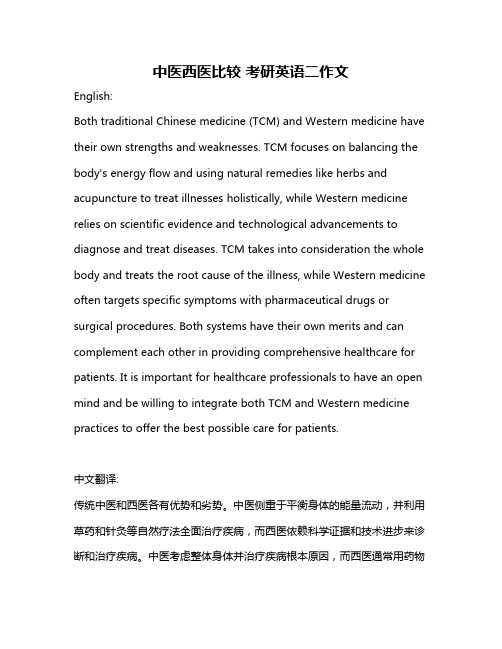
中医西医比较考研英语二作文English:Both traditional Chinese medicine (TCM) and Western medicine have their own strengths and weaknesses. TCM focuses on balancing the body's energy flow and using natural remedies like herbs and acupuncture to treat illnesses holistically, while Western medicine relies on scientific evidence and technological advancements to diagnose and treat diseases. TCM takes into consideration the whole body and treats the root cause of the illness, while Western medicine often targets specific symptoms with pharmaceutical drugs or surgical procedures. Both systems have their own merits and can complement each other in providing comprehensive healthcare for patients. It is important for healthcare professionals to have an open mind and be willing to integrate both TCM and Western medicine practices to offer the best possible care for patients.中文翻译:传统中医和西医各有优势和劣势。
中医和西医的不同英语作文

中医和西医的不同英语作文英文回答:Traditional Chinese medicine (TCM) and Western medicine are two distinct medical systems that have different approaches to health and healing. TCM is rooted in ancient Chinese philosophy and focuses on the balance of yin and yang, as well as the flow of qi (energy) in the body. TCM practitioners use techniques such as acupuncture, herbal medicine, and qigong to treat various health conditions.On the other hand, Western medicine is based on scientific evidence and focuses on diagnosing and treating specific diseases using pharmaceutical drugs, surgery, and other modern medical interventions. Western medicine is often seen as more "cutting-edge" and technologically advanced compared to TCM.One major difference between TCM and Western medicine is their understanding of the body. In TCM, the body isseen as a holistic system where all parts areinterconnected and influenced by external factors like weather and emotions. Western medicine, on the other hand, views the body as a collection of separate systems that can be treated individually.Another difference is the approach to treatment. In TCM, the goal is to restore balance and harmony in the body through natural remedies and lifestyle changes. Western medicine, on the other hand, focuses on targeting specific symptoms or diseases with medications or procedures.For example, if someone has chronic pain, a TCM practitioner may recommend acupuncture or herbal remediesto address the underlying imbalances in the body. On the other hand, a Western doctor may prescribe painkillers or recommend physical therapy to manage the pain.In conclusion, both TCM and Western medicine have their strengths and weaknesses. TCM offers a more holistic approach to health and healing, while Western medicine provides more advanced treatments for specific conditions.It is important for individuals to consider both options and choose the best approach for their own health and well-being.中文回答:中医和西医是两种不同的医学体系,它们对于健康和治疗有着不同的方法和理念。
中医西医对比英语作文
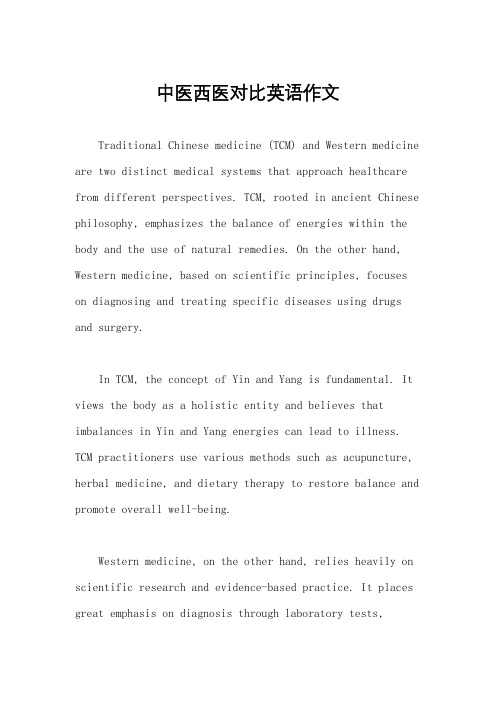
中医西医对比英语作文Traditional Chinese medicine (TCM) and Western medicine are two distinct medical systems that approach healthcare from different perspectives. TCM, rooted in ancient Chinese philosophy, emphasizes the balance of energies within the body and the use of natural remedies. On the other hand, Western medicine, based on scientific principles, focuses on diagnosing and treating specific diseases using drugs and surgery.In TCM, the concept of Yin and Yang is fundamental. It views the body as a holistic entity and believes that imbalances in Yin and Yang energies can lead to illness. TCM practitioners use various methods such as acupuncture, herbal medicine, and dietary therapy to restore balance and promote overall well-being.Western medicine, on the other hand, relies heavily on scientific research and evidence-based practice. It places great emphasis on diagnosis through laboratory tests,imaging techniques, and physical examinations. Treatment often involves the use of pharmaceutical drugs and advanced medical procedures, such as surgery and radiation therapy.TCM emphasizes prevention and believes in treating the root cause of illness rather than just the symptoms. It aims to strengthen the body's natural healing abilities and restore harmony. In contrast, Western medicine tends to focus on symptom management and immediate relief. It is highly effective in acute and emergency situations, where quick intervention is necessary.One notable difference between TCM and Western medicine is their approach to mental health. TCM recognizes themind-body connection and believes that emotional imbalances can lead to physical illness. It employs techniques such as meditation, tai chi, and herbal remedies to promote mental well-being. Western medicine, on the other hand, primarily relies on psychotherapy and psychiatric medications totreat mental health disorders.Another difference lies in their understanding of thebody's structure and function. TCM views the body in terms of meridians and energy flow, while Western medicine focuses on anatomical structures and physiological processes. This contrast is evident in their respective diagnostic methods, with TCM relying on pulse diagnosis and observation of physical signs, while Western medicine utilizes laboratory tests and imaging technology.In conclusion, TCM and Western medicine offer distinct approaches to healthcare. TCM emphasizes holistic well-being, prevention, and natural remedies, while Western medicine focuses on scientific research, evidence-based practice, and technological advancements. Both systems have their strengths and limitations, and a combination of both approaches can provide comprehensive and effective healthcare.。
中医与西医的区别英语作文

中医与西医的区别英语作文英文回答:In terms of the differences between traditional Chinese medicine (TCM) and Western medicine, there are several key distinctions that set the two apart. 。
First and foremost, TCM takes a holistic approach to health, focusing on the balance of the body's energy, or Qi, and the interconnectedness of the body's systems. This isin stark contrast to Western medicine, which tends to focus on treating specific symptoms or diseases with medicationor surgery.Another major difference is the diagnostic methods used in each system. In TCM, practitioners rely on techniques such as pulse reading, tongue diagnosis, and observation of the patient's overall appearance and demeanor to assesstheir health. On the other hand, Western medicine relies heavily on laboratory tests, imaging studies, and otherscientific methods to diagnose and treat illnesses.Furthermore, the treatments themselves differ significantly between the two systems. TCM often utilizes techniques such as acupuncture, herbal medicine, anddietary therapy to restore balance and promote healing. In contrast, Western medicine primarily relies on pharmaceutical drugs, surgery, and other invasive procedures to address health issues.It's also worth noting that the philosophical foundations of TCM and Western medicine are quite different. TCM is rooted in the ancient Chinese philosophy of Taoism, which emphasizes harmony with nature and the interconnectedness of all things. Western medicine, on the other hand, is based on the principles of empirical science and the idea of controlling and manipulating the body's functions to achieve desired outcomes.In conclusion, while both TCM and Western medicine aimto promote health and well-being, they do so through vastly different approaches and philosophies.中文回答:中医和西医之间的区别有几个关键的不同之处。
- 1、下载文档前请自行甄别文档内容的完整性,平台不提供额外的编辑、内容补充、找答案等附加服务。
- 2、"仅部分预览"的文档,不可在线预览部分如存在完整性等问题,可反馈申请退款(可完整预览的文档不适用该条件!)。
- 3、如文档侵犯您的权益,请联系客服反馈,我们会尽快为您处理(人工客服工作时间:9:00-18:30)。
Traditional Chinese Medicine and Western MedicineI. The four diagnostic methods to observe and diagnose diseasesThe four diagnostic methods, named inspection, auscultation and olfaction , inquiry, and pulse-taking and palpation, refer to the four basic procedures used in diagnosing a disease, They are the presuppositions of correct differentiation and effective treatment in TCM.(1) Inspection is the first diagnostic procedure by which the physician may observe the patient's vitality, complexion, physical build, head, neck, five sense organs, skin, tongue, external genitalia and anus on purpose so as to understand the condition of a disease.And it is the outward sign of the conditions of qi and blood, yin and yang,or the zang-fu organs.(2) Another diagnostic method is auscultation and olfaction. Auscultation means listening to the patient's voice, speaking, respiration, coughing and moaning.(3) Inquiry. This is a diagnostic method in which the patient or his companion are inquired to collect the information concerning a disease. The content of inquiry includes the chief complaints, present case history past history, life history, family history, as well as age, sex, native place, occupation, address and so forth inquiry, though covering a wide range of topics, should be conducted step by step in a planned way, with questions focused on the chief complaint and the history of present disease.(4) Pulse-taking and Palpation. It is the fourth diagnostic method, including pulse-taking and, on the other, palpation of different parts of the body. The former is a diagnostic procedure by which the physician may feel the patient's radial arteries with the finger-tips to judge pulse condition, thus learning and inferring the condition of illness. The latter is also a procedure by which the physician may touch, feel, push and press certain parts of the body to detect local abnormal changes, thereby determining the location and nature of the disease.2. The treatment method of Traditional Chinese Medicine(1) acupuncture and moxibustion :One of the oldest forms of Chinese Medicine,Acupuncture involves the stimulation of anatomical points on the body with thin needle.acupuncture patients usually feel little to no pain.Acupuncture needles are hair-thin and are manipulated either by hand or electricity.(2) Massage :Chinese massage is known as Tui N aUses wave-like motions to loosen joints and nourish muscles.Brings awareness back to a person ' s body, making it a first step in t he aling process.Stimulates the flow of Qi, blood and body fluids , Can be used to treat pain, stress or digestion problems.(3) Herbs :Herbs are a vital part of Chinese healing.Each ingredient has unique characteristics.The ingredients work in harmony tohelp a person ' s body.Herbs can help boost Qi and balance Yin/Yang.(4) surface therapeutic method : Just like gua-sha and cupping ,unguent.3. diagnostic method of western medicine(1) inquiry .by the way of talking, the patient or the insider's narration, to understand the patient's condition, and make a preliminary diagnosis.(2) physical examination .the doctor to use their sense organs by inspection, palpation, percussion, auscultation, olfactory examination methods or using a stethoscope, percussion hammer, blood pressure monitor, thermometer and other simple tools for the patient to make a comprehensive, systematic examination to diagnose the patient's disease.(3) laboratory tests .Taking a text in patients with blood, body fluids, secretions, excretions, sampling of cells and tissue specimens,thesewere examined to diagnose the patient's disease.(4) ECG examination . Using the electrocardiographs to records data of body,to check the heart diseases.(5) medical imaging . Using penetrating ability of X-ray , to make the internal structure of the human body appear on the screen or X on-chip shadow to observation and understand the disease situation. We can also use the application of computer tomography technology (CT) and magnetic resonanceimaging (MRI) examination,By this way,we can make a more accurate diagnosis.In short, the western medicine diagnosis take advantage of the medical equipments and advancing Laboratory to diagnose diseases accurately.4. The main treatment of Western MedicineThe main treatment of Western Medicine on the disease with operation treatment, western medicine, laser therapy and chemotherapy.。
